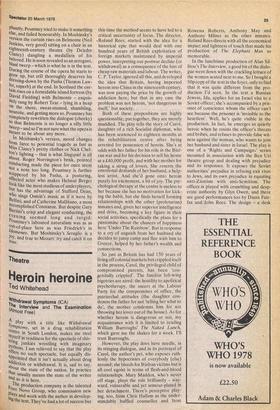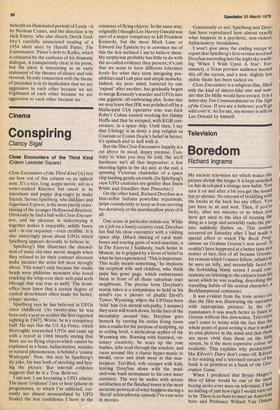Theatre
Heroin heroine
-red Whitehead Withdrawal Symptoms (ICA) The Interview arid The Examination kfilrnost Free) Ac, Play with a title like Withdrawal 'Proms, set in a drug rehabilitation Centre in South London, makes me steel ,,111J:self in readiness for the spectacle of shivering junkies wrestling with imaginary PYthons. I am relieved to say that the play offers no such spectacle, but equally disaPPointed that it isn't actually about drug addiction or withdrawal. It is, sad to say, akbout the state of the nation. In practice ,tat usually means the state of the writer and so it is here. p The production company is the talented ?co Novo Group, who commission new P'aYs and work with the author in developing the text. They've had a lot of success but this time the method seems to have led to a critical uncertainty of focus. The director, .Roland Rees, started with the idea for a historical epic that would deal with one hundred years of British exploitation of foreign markets maintained by imperial power, interpreting our postwar decline (or withdrawal) as a consequence of the loss of cheap raw materials and labour. The writer, C. P. Taylor, ignored all this, and developed the idea that Britain, having imported heroin into China in the nineteenth century, was now paying the price by the growth of addiction here; but that in any case the problem was not heroin, 'not dangerous in itself,' but society.
Both of these propositions are highly questionable; put together, they are merely muddled. The play tells the story of Carol, daughter of a rich Socialist diplomat, who has been sentenced to eighteen months at the rehabilitation centre after being arrested for possession of heroin. She's at odds with her father for his role in the Bigran war and for his decision to sell his house at a £40,000 profit, and with her mother for taking a string of lovers. She resents the emotional demands of her husband, a helpless artist. And she'd gone onto heroin purely for excitement, a bit of joy. The psychological therapy at the centre is useless to her because she has no motivation for kicking the habit, but she finds herself forming relationships with the other (proletarian) inmates and, given her superior intelligence and drive, becoming a key figure in their social activities, specifically the plans for a pantomine about the chances of happiness here 'Under The Rainbow'. But in response to a cry of anguish from her husband she decides to jump camp and flee with him to Greece, helped by her father's wealth and connections.
So just as Britain has had 150 years of living off colonial markets but crippled itself in the process, Carol, the privileged child of compromised parents, has been 'congenitally crippled'. The familiar left-wing bigotries are aired: the hostility to apolitical psychotherapy, the sneers at the Labour Party for the compromises of office, the patriarchal attitudes (the daughter condemns the father for not 'telling her what to do', the mother condemns him for not throwing her lover out of the house). As for whether heroin is dangerous or not, my acquaintance with it is limited to reading William Burroughs' The Naked Lunch, which gave me the shakes for a week. I'll trust Burroughs.
However, the play does have needle, in its stinging dialogue, and in its portrayal of Carol, the author's pet, who exposes ruthlessly the hypocrisies of everybody (else) around; she bleeds for Biafran victims but is all cool egoist in terms of flesh-and-blood relationships. Mary Maddox, who's never off stage, plays the role brilliantly — wayward, vulnerable and yet armour-plated in her detachment. There's perceptive playing, too, from Chris Hallam as the understandably baffled counsellor and from Rowena Roberts, Anthony May and Anthony Milner as the other inmates. Roland Rees directs with all the economical impact and lightness of touch that made his production of The Elephant Man so memorable.
In the lunchtime production of Alan Sillitoe's The Interview, a good bit of the dialogue went down with the crackling lettuce of the women seated next to me. So I bought a 50p copy of the text in the foyer, only to find that it was quite different from the production I'd seen. In the text a Russian Jewess, Ida, applies for an Israel visa to a Soviet officer; she's accompanied by a prisoner of conscience whom the officer can't see because the prisoner is `invisible to the heartless'. Well, he's quite visible in the production. In fact, he emerges as quietly heroic when he resists the officer's threats and bribes, and refuses to provide false witness against the woman, who wants to join her husband and sister in Israel. The play is one of a `Rights and Campaigns' series mounted in association with the Ben Uri theatre group and dealing with prejudice and its responses. It exposes the Soviet authorities' prejudice in refusing exit visas to Jews, and its own prejudice in equating anti-Zionism with anti-Semitism. The officer is played with crumbling and desperate authority by Glyn Owen, and there are good performances too by Diana Fairfax and John Rees. The design — a desk beneath an illuminated portrait of Lenin —is by Norman Coates, and the direction is by Jack Emery, who also directs Derek Godfrey's carefully enunciated reading of a 1954 short story by Harold Pinter, The Examination. Pinter's debt to Kafka, which is obscured by the curlicues of his dramatic dialogue, is transparently clear in his prose, but the piece is interesting as an early statement of the themes of silence and role reversal. Its only connection with the theme of prejudice is in its implication that we are aggressive to each other because we are frightened of each other because we are aggressive to each other because we . . .



































 Previous page
Previous page